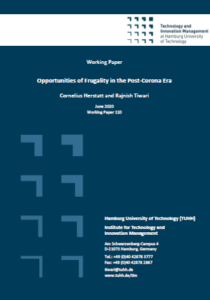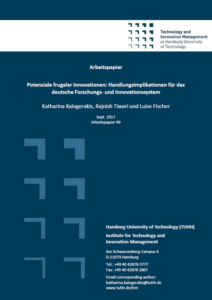A discussion paper by Cornelius Herstatt and Rajnish Tiwari on the opportunities of frugality-based approaches in the post-Corona era: How frugal innovations can help achieve “affordable green excellence” in a world that could do with more effective use of resources. They argue that the concept of “affordability” has to be considered more comprehensively and in a multidimensional perspective – not just financially, but also socially, infrastructurally and ecologically.
[Download discussion paper]
 The world is undergoing a major societal upheaval. Probably for the first time in the human history large parts of economic activity have come to a standstill simultaneously in almost all parts of the world – affecting the economically advanced nations as much as the developing countries. The “lockdown”, a term not known by many prior to the Corona pandemic of 2020, has meant that populations have been (in some cases literally) forced to stay back at home, cut down on their social contacts due to fear of a community transmission of the COVID19 virus, and as a result international and even domestic and local travel has largely come to a halt.
The world is undergoing a major societal upheaval. Probably for the first time in the human history large parts of economic activity have come to a standstill simultaneously in almost all parts of the world – affecting the economically advanced nations as much as the developing countries. The “lockdown”, a term not known by many prior to the Corona pandemic of 2020, has meant that populations have been (in some cases literally) forced to stay back at home, cut down on their social contacts due to fear of a community transmission of the COVID19 virus, and as a result international and even domestic and local travel has largely come to a halt.

SARS-CoV-2. Image: CDC/ Alissa Eckert, MS; Dan Higgins, MAM / Public domain
Economic activity has been severally affected in most nations and many people have either lost jobs or have had to reduce their working hours, negatively impacting their disposable income. While, understandably, there is a growing demand for restoring “normalcy”, there are also voices that warn against returning to the “old normal” as if nothing has happened that requires a serious reflection. These voices plead for utilizing the current crisis to develop a “new normal” by utilizing its opportunities, e.g. the unintended-yet-largely-positive environmental impact and the slowing down of the pace of life resulting in reduced stress levels for people who are in a position to better manage social and economic impact of the pandemic.
This discussion paper makes a plea for a more holistic reflection over the causes and effects of the several other urgent challenges facing the world that have been laid bare by COVID19, e.g. climate change, poverty, and diseases. In this current context, we take a closer look at frugal innovations, a concept that has grown in importance over the previous decade and has been known to enable affordable access to goods and services. We examine if and how frugal innovations can be used to develop a “new normal” that acts as an enabler of “affordable green excellence”.
Taking a normative approach, we propose that affordability should be defined in a much more comprehensive manner to includes monetary, societal, infrastructural and environmental affordability. Further, a much closer interaction to the principles of circular economy is proposed. The overlap of frugal innovations and circular economy is the ideal space that should be strived by societal stakeholders, as products that target high environmental affordability without paying enough attention to monetary, societal and infrastructural affordability are as likely to face challenges as are products that are affordable monetarily and in other terms but whose environmental fit is questionable. Policy makers are called upon to create enabling mechanisms to promote affordable green excellence that is required in the post-Corona world even more than it already was prior to the pandemic outbreak.
Note: This discussion paper documents initial ideas with the intention of advancing research on “affordable green excellence”. We invite comments, feedbacks and ideas for collaborative transdisciplinary research/projects from interested colleagues from academia, industry, policy-making institutions and other domains, such as foundations and non-government organizations.






